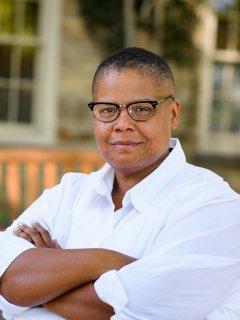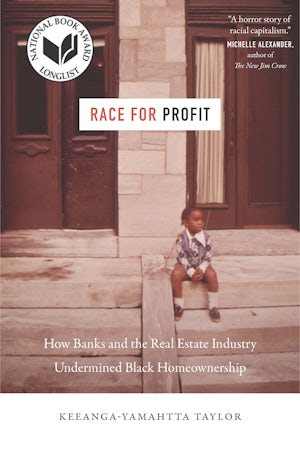Race for Profit
A Matrix Lecture by Keeanga-Yamahtta Taylor
Matrix is located on the 8th floor of Barrows Hall, on the UC Berkeley campus, near Telegraph and Bancroft Avenues, just up the hill from Sather Gate. There are entrances at both ends of the building, but only one of the elevators on the eastern side goes directly to the 8th floor. You can alternatively take the elevator to the 7th floor and walk up the stairs.

Please join us on January 24, 2020 from 12pm-1:30pm for a Matrix Lecture by Keeanga-Yamahtta Taylor, Assistant Professor of African American Studies at Princeton University. She will discuss her book, Race for Profit: How Banks and the Real Estate Industry Undermined Black Homeownership, which was published in 2019 by University of North Carolina Press and has been longlisted for a National Book Award for nonfiction.
RSVP HERE
Abstract
 By the late 1960s and early 1970s, reeling from a wave of urban uprisings, politicians finally worked to end the practice of redlining. Reasoning that the turbulence could be calmed by turning Black city-dwellers into homeowners, they passed the Housing and Urban Development Act of 1968, and set about establishing policies to induce mortgage lenders and the real estate industry to treat Black homebuyers equally. The disaster that ensued revealed that racist exclusion had not been eradicated, but rather transmuted into a new phenomenon of predatory inclusion.
By the late 1960s and early 1970s, reeling from a wave of urban uprisings, politicians finally worked to end the practice of redlining. Reasoning that the turbulence could be calmed by turning Black city-dwellers into homeowners, they passed the Housing and Urban Development Act of 1968, and set about establishing policies to induce mortgage lenders and the real estate industry to treat Black homebuyers equally. The disaster that ensued revealed that racist exclusion had not been eradicated, but rather transmuted into a new phenomenon of predatory inclusion.
Race for Profit uncovers how exploitative real estate practices continued well after housing discrimination was banned. The same racist structures and individuals remained intact after redlining’s end, and close relationships between regulators and the industry created incentives to ignore improprieties. Meanwhile, new policies meant to encourage low-income homeownership created new methods to exploit Black homeowners. The federal government guaranteed urban mortgages in an attempt to overcome resistance to lending to Black buyers – as if unprofitability, rather than racism, was the cause of housing segregation. Bankers, investors, and real estate agents took advantage of the perverse incentives, targeting the Black women most likely to fail to keep up their home payments and slip into foreclosure, multiplying their profits. As a result, by the end of the 1970s, the nation’s first programs to encourage Black homeownership ended with tens of thousands of foreclosures in Black communities across the country. The push to uplift Black homeownership had descended into a goldmine for realtors and mortgage lenders, and a ready-made cudgel for the champions of deregulation to wield against government intervention of any kind.
Narrating the story of a sea-change in housing policy and its dire impact on African Americans, Race for Profit reveals how the urban core was transformed into a new frontier of cynical extraction.
Biography
Keeanga-Yamahtta Taylor writes and speaks on Black politics, social movements, and racial inequality in the United States. She is author of From #BlackLivesMatter to Black Liberation, which won the Lannan Cultural Freedom Award for an Especially Notable Book in 2016. She is also editor of How We Get Free: Black Feminism and the Combahee River Collective, which won the Lambda Literary Award for LGBQT nonfiction in 2018.
Her third book, Race for Profit: How Banks and the Real Estate Industry Undermined Black Homeownership, published in 2019 by University of North Carolina Press, has been longlisted for a National Book Award for nonfiction.
Taylor’s writing has appeared in the New York Times, Los Angeles Times, Boston Review, Paris Review, Guardian, The Nation, Jacobin, and Souls: A Critical Journal of Black Politics, Culture, and Society, among others.
Taylor is a widely sought public speaker and writer. In 2016, she was named one of the hundred most influential African Americans in the United States by The Root. She has been appointed as a Distinguished Lecturer for the Organization of American Historians by the Organization of American Historians, and as the Charles H. McIlwain University Preceptor at Princeton University from 2018-2021.
She is Assistant Professor of African American Studies at Princeton University.
Co-Sponsors
Department of African American Studies, Gender and Women's Studies, and Global Metropolitan Studies.



